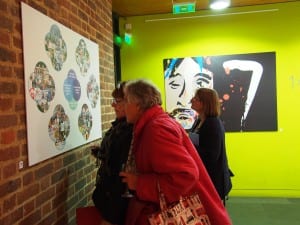Communicating without words: the power of art as a tool of expression
By news editor, on 24 October 2013
![]() Written by Maria Black, retired UCL clinical linguist
Written by Maria Black, retired UCL clinical linguist
What would you do if a stroke or head injury robbed you of your ability to communicate verbally? How would you preserve your sense of self and connection to the world if understanding language became unreliable, your speech disappeared, or your capacity to read and write shrank?
‘Communicating without words’, an innovative exhibition organised by the UCL Communication Clinic, offers us a unique opportunity to explore these questions through the art and experiences of artists with language and communication difficulties. The free exhibition takes place from 14-29 October 2013 in The Lumen Gallery.
Although aphasia affects more than 367,000 people in the UK and aphasiology is a well-established multi-disciplinary research field, there is little public awareness of this condition, which can occur at any age.
The artworks in this exhibition, together with an excellent guide and video interviews with four of the artists, directly show us how we can find new means of communication, even when we are lost for words.
 Close
Close



